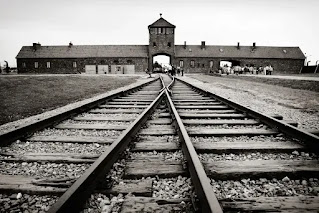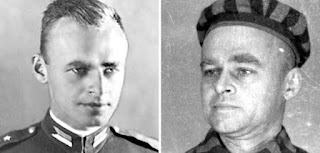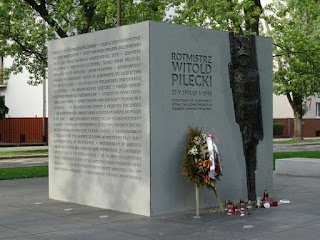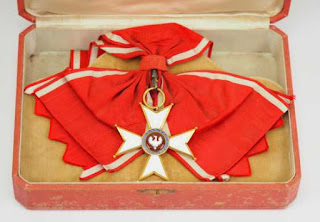- Get link
- X
- Other Apps
- Get link
- X
- Other Apps
Spy inside Nazi Camp
I bet that even if I offered to pay you a hefty sum to go back in time to world war II and get yourself imprisoned in the Auschwitz concentration camp, you'd probably answer, "no way!" This is assuming that we have access to our own special time portal, which- for the records- we do not.
So if you answered, "no" to my offer, that would probably be a wise decision. Your odds of dying in the notorious death camp are higher than surviving through it to enjoy the prize money I give you in the end. Such a challenge would be too much even for our favorite guinea pig! But there was one man in history, the only person brave and crazy enough to volunteer to go to Auschwitz.
 |
| Auschwitz Concentration Camp. |
He went by the name of Witold Pilecki. Before you question Pilecki's sanity, you should first understand that he didn't know how intense the camp actually was when he agreed to go. The thing is, little was known about the camp at the time. The knowledge of its happenings behind its closed doors wasn't as widespread as it is today. As a Polish cavalry officer and intelligence agent, Pilecki's mission was to go in and gather information about the site for the purpose of finding out what exactly was going on there. Then he'd report his findings to the Western Allies. Easy, right?
 |
| Witold Pilecki. |
His fight against the Germans did not begin with the mission. He'd had prior experience fighting against them in the 1939 Defensive War. As a man of resistance, he couldn't sit back and let the Nazi plague take over. He felt compelled to do something about it. That's why, when he heard about the position to be sent to infiltrate the camp, he put his best foot forward and volunteered. What a good sport. Talk about taking one for the team!!..
Pilecki orchestrated and presented his plan of he was going to infiltrate the camp, gather information of its functions, and organize a resistance movement within its walls. This plan was approved. It seemed relatively simple and why wouldn't the prisoners want to join in resisting?
Well, knowing what we know now, in hindsight, there are some major flaws with this idea. That is, the prisoners would have likely been very malnourished, physically weak with broken spirits, some on the brink of natural death. Such a resistance movement couldn't possibly make a dent on the impact against the Nazis, right?
Unless, perhaps you didn't fight back with the physical strength but, rather, came up with a cunning plan using mind over matter. But how would this be done?
 |
| Poland after World War II. |
That would be challenging for Pilecki to figure out once he was there. His plan was put in place on September 19, 1940, when he purposefully entered an area where he knew the German Army was rounding up Polish civilians. He carried false documents with him, registered under the name of Tomasz Serafinski. That day, he was among 2,000 civilians to be detained. Then, after two days in detention, suffering beating along with other prisoners, he was finally sent to Auschwitz where's he was registered as number 4859. Who knew what thoughts ran through his head when he first witnessed the atrocities of the camp firsthand? Perhaps he was internally kicking himself for going through with this crazy plan. That's what I might assume he'd be thinking on a human level. But there was no turning back. All he could do was remain strong and focus on putting his plan into motion. Thankfully, he had help. He probably recognized immediately that he would need to boost prisoner's moral. The best way he could do this was by informing them of the current updates from the fronts of World War II and giving them hope. He organized his secret resistance operation under the Nazi's noses, delivering and receiving messages to and from the outside using a courier system, channeling reports to the allies. Through this, he stealthily acquired secret stashes of food, clothing, and medicines for the prisoners.
All the while he was assisting prisoners in their preparation for escape. Thanks to his efforts, it was as early as 1941 when he'd inform Britains and the United States of what was secretly going on, that Nazis were actively exterminating Jews. Yet, one matter that remains questionable has to do with why nothing was done to end the mass murders that were learned about so early on, particularly by Wiston Churuhill. Perhaps Britain thought to approach the atrocity with tact and strategic maneuvering but realized they couldn't manage it until they'd won the war. The matter is unclear.
 |
| Witold Pilecki Memorial. |
Pilecki, however, didn't realize that the allies have no intention of liberating the camp. When his underground resistance group learned about the gas chambers by 1942, they scurried to come up with different plans to liberate Auschwitz. One plan involved the idea of bombing the walls and having the Polish paratroopers fly-in from Britain. But once Pilecki realized the truth, that he was on his own, he decided he would have to find his own means of escape. If you imagine the frightening reality of his situation, that he'd entered the camp thinking he'd have help but was now left to fend for himself, it's easy to think that you might panic if you were in his shoes.
In 1943, he escaped with two other prisoners. They achieved this by cutting telephone and alarm wires. They used a duplicate key to unlock the door. They then barricaded the door they'd exited through and crossed a river so that they wouldn't leave footprints to be followed. Pilecki had spent a total of 2 and a half years at the camp, sneaking messages to Allies. If you think about it, 2 and a half years was a long time to spend in Auschwitz, forced to live in horrible conditions. Many of us may not have lasted a day there. After his long ordeal and his plan of liberation falling flat on his face, he was captured in 1944 while fighting in the Warsaw uprising. He spent the remaining war in yet another prison camp, a prisoner-of-war camp.
 |
| Order of Polonia Restituta. |
If you think that wasn't bad enough, he then joined Polish troops in Italy in 1945, agreeing to return to Poland in order to gather intel on the Soviet takeover. He was caught once again, this time by the Polish Communist regime. It was during this time that he was interrogated on his espionage and tortured severely. After a trial, he was given three death sentences. Yes, that's right! Not just one but three! with this Pilecki's heroic career ended with his execution on May 25, 1948, at Warsaw's Mokotow Prison. He was killed by gunshots to the back of his head, a sad end to a very brave man who'd survived Auschwitz. He was 47 years old.
It wasn't until much later in 1989 when the secrecy behind his true heroism emerged into public knowledge upon the collapse of Communism. Well after his death in 1995, he received the Order of Polonia Restituta, and, in 2006, he received the Order of the White Eagle, the highest Polish decoration.
 |
| Order of the White Eagle. |
Pilecki was one out of many Poles who'd helped Jews during the Holocaust. Many, like Pilecki, paid the price of their heroism with their lives. There are a lot of people like those who did not earn the recognition they deserved. They performed acts of goodness without anything to gain in return they should be honored.
If you found this article interesting-- and face it, of course, you did!--Then feel free to check out my other posts and don't forget to drop a comment!
- Get link
- X
- Other Apps
Comments
Post a Comment